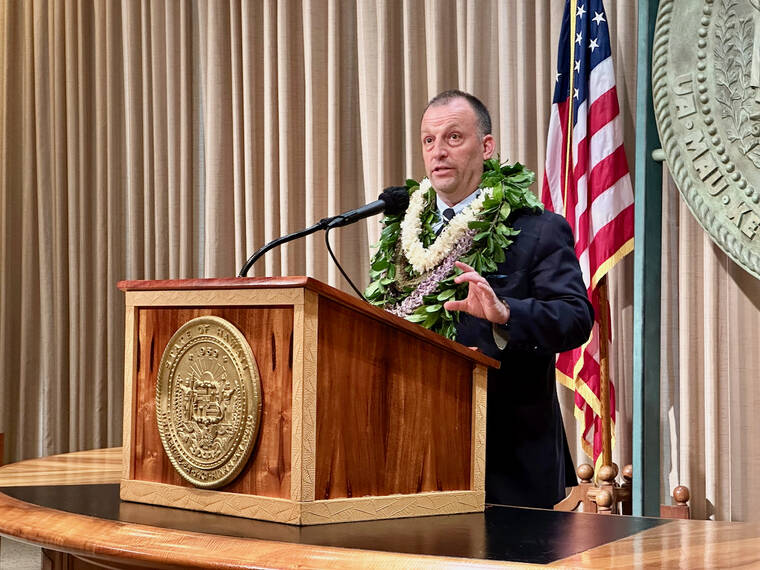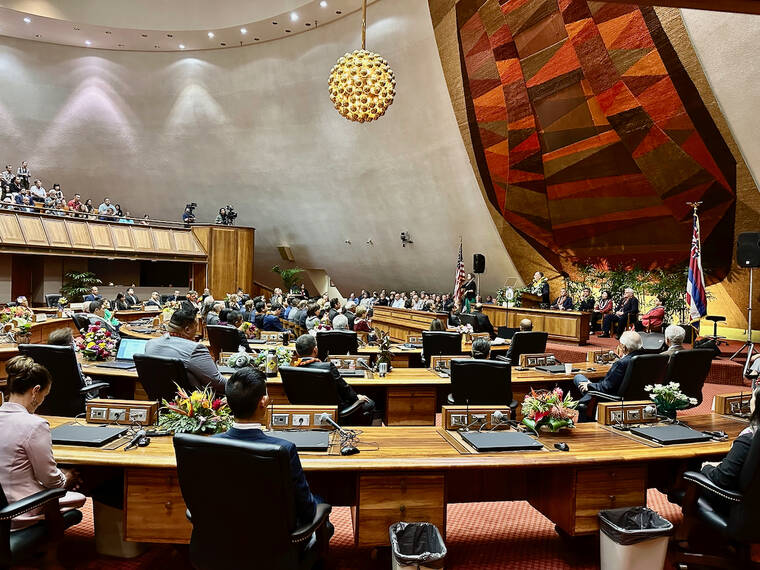Hawai‘i governor hails support for Maui in State of the State address


HONOLULU — Hawai‘i Gov. Josh Green on Monday used his annual State of the State address to lead lawmakers and guests in a moment of silence for victims of the Lahaina wildfire and to propose aggressive steps to shift more vacation rentals into residential use to meet both Maui and the state’s acute housing needs.
Those gathered for the speech delivered a standing ovation to two Maui firefighters — Keahi Ho and Koa Bonnell — who traveled from Maui for the governor’s talk, which focused heavily on helping Maui recover from August’s deadly wildfires.
“The people of Maui have shown strength in the face of adversity,” said Green, a Democrat. “But the days ahead will not been easy and they will continue to need our support and we will be there for them as long as it takes.”
A wildfire fueled by hurricane-force winds raced through the historic coastal town of Lahaina on Aug. 8, killing 100 people and destroying thousands of homes and buildings.
Green’s acknowledgment of all those who rushed to Maui’s aid after the fire brought tears to the eyes of state Rep. Dee Morikawa, the House majority floor leader and a Democrat representing the western part of Kaua‘i and Ni‘ihau.
“It’s just good to know that all of Hawai‘i is coming together for Maui,” Morikawa said after the address.
The most urgent unmet need on Maui is now stable long-term housing for some 5,000 residents, who are staying in hotel rooms because they haven’t been able to find affordable places to rent on the island, one of the nation’s most expensive places to live.
Green aims for all 5,000 to move into long-term housing by March 1 in part by encouraging owners of vacation rentals to make their units available to wildfire evacuees. He told reporters authorities have about two-thirds of the needed housing units lined up so far. The Federal Emergency Management Agency and charitable organizations will be covering the rental costs.
More broadly and longer-term, Green proposed a two-year “tax amnesty” to encourage owners of vacation rentals around the state to sell to owner-occupants or long-term rental landlords. Participants would be exempt from capital gains, conveyance and general excise taxes under this two-year program.
Green told reporters afterward he was going to put “a lot of pressure” on short-term rentals because he didn’t believe they were appropriate.
“I don’t want to be rude, but I do want people to realize that that market should be for our local families,” Green said.
He noted that workers in a range of fields — including nurses now on strike at the state’s only pediatric hospital — are struggling because of Hawai‘i’s housing shortage and high housing costs.
In addition, Green said he’s asking the Legislature to put $373 million in the budget for infrastructure and housing.
“This remains our administration’s top statewide priority,” he said.
Green revisited the idea of imposing a fee on travelers to help pay for environmental upkeep after a proposal to do so died in committee last year. The governor suggested charging each family visiting Hawai‘i a $25 “climate impact fee” when they check in to their hotel or short-term rental. He said this would raise $68 million a year.
Democratic House leaders identified common priorities with the governor, particularly on affordable housing, mental health care and climate change.
The House Finance Committee’s chairperson, Rep. Kyle Yamashita, said he would have to look at the details of the governor’s tax amnesty plan but indicated he was open to the idea.
“At the end of the day, I think we have to look at every option to deal with this issue,” said Yamashita after the speech. “They are affecting residential areas throughout the state. And it’s something that we have to look into more deeply.”
House Speaker Scott Saiki said the House would cooperate with the governor.
“We need to solve problems in our state, and we need to find solutions that are going to be workable,” Saiki said.



